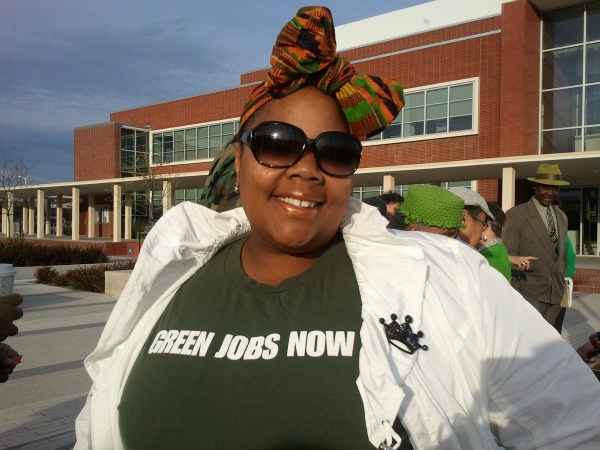Communities for a Better Environment sees in the emerging green economy an incredible opportunity for the environmental justice community. CBE has worked since 1978 in support of low-income communities and people of color in California in the fight to reduce and prevent the local pollution that endangers health and undermines their quality of life.
The social movement that has grown from that work—the environmental justice movement—can shape this nascent green economy.
 Domestic U.S. energy consumption contributes one quarter of the greenhouse gases that cause global warming. The public sector offers enormous potential for green economic development if we were to invest in it: greening public buildings, retro-fitting and weather-sealing schools and government offices, cleaning up existing local pollution in brownfields, completing the restoration of highly polluted communities by creating and maintaining park space and community gardens.
Domestic U.S. energy consumption contributes one quarter of the greenhouse gases that cause global warming. The public sector offers enormous potential for green economic development if we were to invest in it: greening public buildings, retro-fitting and weather-sealing schools and government offices, cleaning up existing local pollution in brownfields, completing the restoration of highly polluted communities by creating and maintaining park space and community gardens.
Investing in these labor-intensive initiatives would create local jobs in communities that need them.
Clean energy is another potential sector—investment would not only steer us away from the fossil fuels that accelerate climate change, it would efficiently create jobs. Investing $1 million in fossil fuels would generate 5.3 jobs—that same amount invested in clean energy will generate 16.7 jobs. Read the Greenbiz article regarding job creation and clean energy investment.
We must mobilize a broad and powerful countervailing social movement to shape the future green economy to be equitable and environmentally sustainable.
Three principles guide our efforts:
Equity — The opportunities and benefits of this new economy should be directed primarily at those communities most in need – that is, poor urban and rural communities, especially those with large numbers of people of color. It means equal access to the entire range of green jobs, by locating green research and development institutes in these communities and providing comprehensive education to prepare working class people of color and poor whites for jobs in the green economy.
Ecological Justice (Eco-justice) — Eco-justice means that all elements of the green economy should be directed toward halting global warming and addressing the global ecological crisis. The focus must be on the restoration and creation of a green environment in those communities most horribly impacted by polluting industries—urban toxic hotspots, rural areas destroyed by coal production or corporate agribusiness. Eco-justice includes comprehensive, community-based research of health problems caused by pollution. Green manufacturing jobs should be in or near poor communities, but only with the strongest protections for employee and public health.
Democracy and Economic Justice — Democracy is a central principle of our green economic vision. That means transparency in decision-making and public participation at all levels of the decision-making process. Economic justice means a worker- and woman-centered economy, one that pays a living wages, and provides good health benefits and access to quality, affordable childcare. Lastly, democracy and economic justice mean the unrestricted right to organize into unions.


